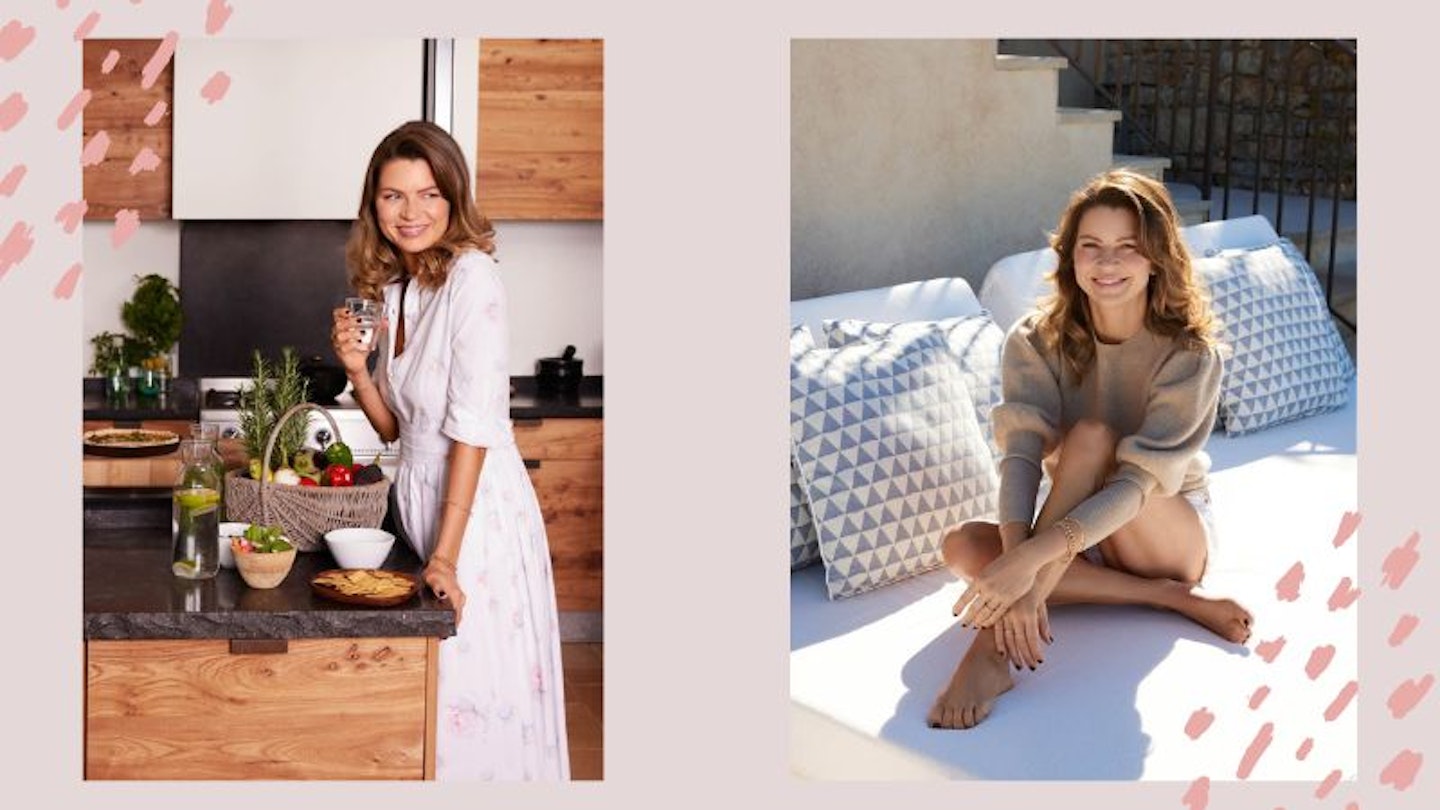The average age of first time mothers has been rising steadily since the 1970s, and births to women over the age of 40 are now double that of teenagers. Where once pregnancies over 35 would have been termed 'geriatric pregnancies', now more and more women are enjoying healthy and happy pregnancies and birth in their late thirties and forties.
But while attitudes are changing, pregnancy and parenting can come with challenges, including lower energy supplies and hormonal shifts. Having just given birth to her fourth child at the age of 45, Gabriela Peacock, nutritionist, nutraceutical expert and founder of GP Nutrition, knows a thing or two about how to nourish your body in preparation for these challenges.
With an enviable client list that includes Princess Beatrice, Jodie Kidd and Yasmin Le Bon, you might expect Gabriela to advocate a strict diet with no sugar, chocolate or coffee. So you'll be relieved to hear that not only are snacks and treats allowed, they're a great way of helping busy mums to get through the day!
Mother&Baby sat down with Gabriela to talk about pregnancy and parenting in your 40s, how diet and nutrition can help your body cope, and her favourite snacks for healthy on-the-go refuelling.
Protein: the body's building blocks
Protein is something that comes up regularly throughout my chat with Gabriela, noting that it's "absolutely essential for everything" from fertility to pregnancy, postpartum to breastfeeding. "Protein is an element for every single part of your life. It doesn't really matter if you're pregnant or not." She describes it as "a building block within your body", and an area of your diet to prioritise whether you're trying to conceive, are pregnant, or in the postpartum period. This means having protein with every single meal, or adding protein powders as an easy way of upping your intake.
If you're prone to a mid-afternoon slump and tend to reach for a slice of cake or a biscuit, protein can help here as well. "This is where the majority of my clients fail a little bit - that mid-afternoon, three o'clock when you feel like something sweet. What I always say is if you have a teeny bit of protein, then you will still have a piece of cake, but you will have much smaller slice, or you will still have a piece of chocolate, but you're not going to eat the whole bar." So hard-boiled eggs, hummus and protein-rich crackers, followed perhaps by a little bit of chocolate...
Nutrition's role in supporting fertility for older mothers
Gabriela has recently given birth to her fourth child at the age of 45 and is an advocate for looking after yourself as a way to improve your fertility later in life. "Food and nutrition have a great influence on reproduction because whatever you put into your body will react to it and the effect will be positive or negative. So if you want to get pregnant or if you're preparing your body for pregnancy, it's very important to look after your body as much as you can."
While no specific foods can guarantee improved fertility, she points out that if your body isn't nourished or you're under stress, it can affect your hormones and decrease your chances of falling pregnant. "Unless your body is in a healthy equilibrium, your body's priorities will not be to the reproductive system."
She points out that the vast majority of us are deficient in some vitamin or mineral so alongside protein and a good diet, she recommends a high quality multi-nutrient such as EverydayMe Pre-Natal & Pregnancy Support. "It's vital to make sure you have a good baseline of all the nutrients your body needs in order to stay healthy".
"Unless your body is in a healthy equilibrium, your body's priorities will not be to the reproductive system."
A balanced pregnancy diet
Gabriela, like many mothers who give birth later in life, found that she was better prepared for pregnancy in her forties than when she had her first child 13 years ago. "I feel like it was actually slightly easier this time than it was with my firstborn. With my first pregnancy, I almost used the fact that I was pregnant as a kind of green card to just eat everything." I think we can all empathise with that approach!
As she goes on to say, "I definitely wasn't eating very good foods. There was that gateway of 'oh, I can start eating biscuits. I can start eating sweets', which is a bit silly, really. So with this pregnancy, I was much more conscious of that. Although I treat myself all the time, whether I'm pregnant or not, so I was still eating everything but perhaps slightly more consciously."
Nurturing and healing postpartum
As Gabriela points out, "pregnancy happens gradually. Post-pregnancy happens in one day and it's such a massive shock for the body." This can leave your hormonal balance out of kilter, just as you're also dealing with a lack of sleep and a huge lifestyle change. When you're attending to the needs of a new baby, it can be tough to also look after your own needs.
As with so much of her advice, Gabriela advocates the easy wins and a relaxed approach that takes the pressure off new mums. Food in those early months needs to be easy and quick, so just keeping your fridge stocked with things like hard-boiled eggs, hummus, crackers made of protein-rich chickpeas or lentils, and protein bars. She recognises that cooking meals from scratch is near impossible in the postpartum period (though she's a big fan of batch cooking) which is why supplements can take some of the stress out of trying to get all your nutrients from food.
"I find supplements are a helping hand, especially in pregnancy and postpartum because you don't have time to focus on an excellent diet. You've just had a new baby - there's no way you could be cooking two meals from scratch." She smiles, "you know, we are lucky to just grab something from the fridge if you have time between baby feeds." Supplements let you keep your nutrient levels up without relying on food, which as she points out, can be very stressful.
In terms of the supplements your body needs in that postpartum period, she recommends magnesium to help with your sleep, B vitamins to maintain your energy levels during the day and omega-3 essential fatty acids which help with your mental health and baby's brain development if you're breastfeeding. (Consult your GP before starting a supplement programme if you're pregnant or breastfeeding).
"Pregnancy happens gradually. Post-pregnancy happens in one day and it's such a massive shock for the body."

Managing stress and boosting energy in parenting
It probably goes without saying that parenting comes with a side serving of stress, whatever your age. Having the energy to deal with the demands comes down to diet and once again, protein is key, as is snacking. In fact, it's one of her main tips. "Snacking is important. Don't feel like you need to eat proper meals at all times. Snacking, as long as it's healthy snacking, is absolutely fine. It just has a bit of a bad reputation". As a teen in the 90's I certainly feel guilty whenever I snack so I'm relieved to hear this, even more so when she mentions dark chocolate covered Brazil nuts as an option!
In fact, Gabriela is a great advocate of breaking the rules in the name of reducing stress levels. "What I encourage my clients to do, is to not feel like you can't switch foods around. For example, if you want to have a porridge in the evening, because it's extremely convenient, it's absolutely fine. There's no such thing as breakfast foods or dinner foods - sometimes I have soup for breakfast because I just like it." As she says, as long as your food is healthy, it doesn't matter what or when you eat.
If it's porridge, she recommends adding "a really big tablespoon of nut butter or pumpkin seed butter" as a quick and easy way to increase the protein levels. By choosing healthy snacks and focusing on protein, you can balance your blood sugar levels and keep your energy up - which we all know is vital when you're a parent of children who seem to be on the go 24/7!
And coffee? Also fine. You could also try green tea or matcha which contain strong polyphenols for longevity and reduced inflammation, but if you need a caffeine fix, don't feel guilty about a cup of coffee. "Coffee is actually really good for you. It's fantastic for longevity, it also supports your cognitive function, so it makes you a bit sharper. It's fine, especially when you're exhausted, so don't be too hard on yourself." She does note that milk can be a problem "because if you drink a lot of milk, at some point you will end up having some kind of intolerance. So if you drink coffee with milk, I suggest rotating different types of milks and focus on nut milks as well."
"Snacking is important. Don't feel like you need to eat proper meals at all times. Snacking, as long as it's healthy snacking, is absolutely fine. It just has a bit of a bad reputation".
Eating well without stress
The main takeaway from chatting with Gabriela is that we need to cut ourselves some slack. Pregnancy and parenting can be physically challenging, especially in your late 30s and 40s. So keeping your body nourished is key, but doing that in a way that doesn't pile any more pressure or stress onto an already overloaded mental load. From supplements to a handy supply of healthy snacks, and protein with every meal (and it's fine if that meal is a dinner of porridge), it's the quick and easy wins that nourish both body and mind.
About the expert
A former model, double Sunday Times bestselling author, A-List Nutritionist and Nutraceutical Expert (clients include Princess Beatrice, Joan Collins and James Blunt), Gabriela Peacock is a name people trust for health advice. “The reason why I got into nutrition was all the irresponsible food myths I was exposed to while I was modelling,” she says. “I believe in balance. I never judge. We don’t have to be perfect, but we can do things to help take care of ourselves.” Her interest in biochemistry and the impact supplements can have on health and wellbeing led her to design a supplement range, GP Nutrition, that helps you do that.
About the author
Rebecca Lancaster is a Digital Writer for Mother&Baby, drawing on ten years of parenting her two children to help others navigating their own parenting journey. As a freelance writer, she spent ten years working with leading lifestyle brands, from travel companies to food and drink start-ups, and writing everything from hotel reviews to guides to the best British cheeses. She’s particularly interested in travel and introducing her children to the excitement of visiting new places, trying different foods (less successfully) and experiencing different cultures.
